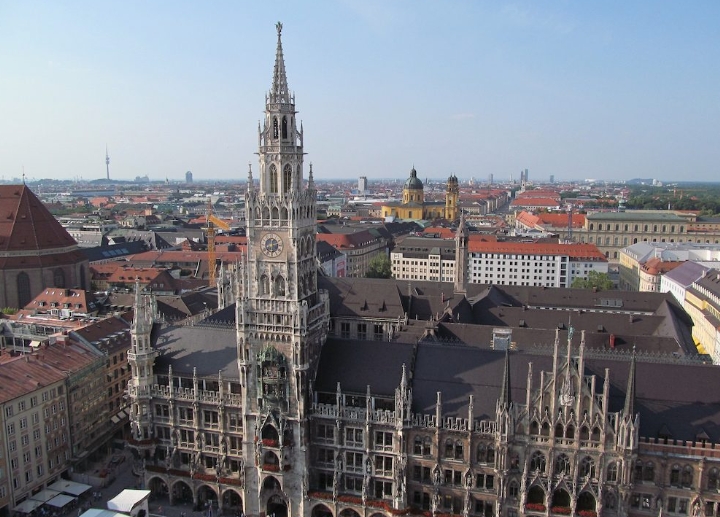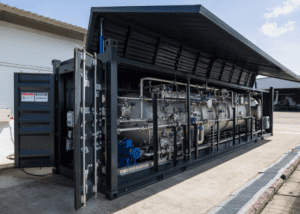
Panorama over Munich
The German Geothermal Association (Bundesverband Geothermie / BVG) has published the newest version of the “Deep geothermal projects in Germany” map, which lists all existing projects as well as those under construction and planning.
The current edition shows that the number of projects in planning has increased sharply. The BVG further explains what needs to be done to ensure that the great expansion dynamic is not slowed down in the coming years.
There are currently 42 deep geothermal plants in operation. A total of 40 of these plants use geothermal energy to provide heat, usually through boreholes several thousand meters deep. Another eleven feed electricity into the grid and, in some cases, in addition to district heating.
There are also currently 16 plants under construction. The number of exploration permits has almost doubled in the past two years – from 82 in January 2023 to 155 plants that are currently planned. The project could provide between one and two gigawatts of heat (and in some cases also electricity).
“The potential for geothermal energy in Germany is immense. The use of natural thermal water resources with the help of deep geothermal energy alone could potentially cover around a quarter of Germany’s heating and cooling needs,” says Gregor Dilger, Managing Director of the Federal Geothermal Association (BVG).
“For many municipal utilities and private companies, geothermal energy is an interesting option for providing safe and affordable heat in the long term. That is why interest has increased significantly in recent years. In addition, there is a great deal of know-how and experience with such projects in Germany. However, investors and service providers want a reliable commitment from politicians and the associated investment security.”
Geothermal support needed from the next government
The industry is demanding from the next federal government a clear expansion strategy for the use of all geothermal technologies and improvements to the framework conditions with expansion targets for deep, medium-deep geothermal energy and near-surface geothermal energy. The financial protection of geothermal drilling developed by the federal government, the state development bank KfW and a private insurer must be introduced quickly. It is suitable for securing investments worth billions with a low budget requirement.
In order for the heat transition to progress more quickly, the next government must promptly adopt the simplifications and accelerations that were included in the Geothermal Energy Acceleration Act, which was slowed down by the breakdown of the coalition.
If the target of growing deep geothermal energy from 1.8 TWh to 10 TWh per year by 2030 was achieved, the geothermal industry could create around 24,000 new jobs while reducing CO2 emissions by 34 million tons. Avoiding the importation of fossil fuels can also save import costs of up to EUR 9 billion.
The association updates the map on an annual basis. In addition, the BVG now also offers a digital map, which is updated at regular intervals throughout the year.
About the German Geothermal Association
The German Geothermal Association (BVG), founded in 1991, is an association of companies and individuals active in the field of geothermal energy use in all areas of research and application. It brings together members from industry, science, planning and the energy supply sector.
The main tasks of the association are to inform the public about the possible uses of geothermal energy for heat and electricity generation and to engage in dialogue with political decision-makers. The BVG organizes the annual DGK geothermal congress, which takes place from November 18-20, 2025, as well as workshops on current topics and is the publisher of the specialist magazine “Geothermal Energy” and other information materials.





